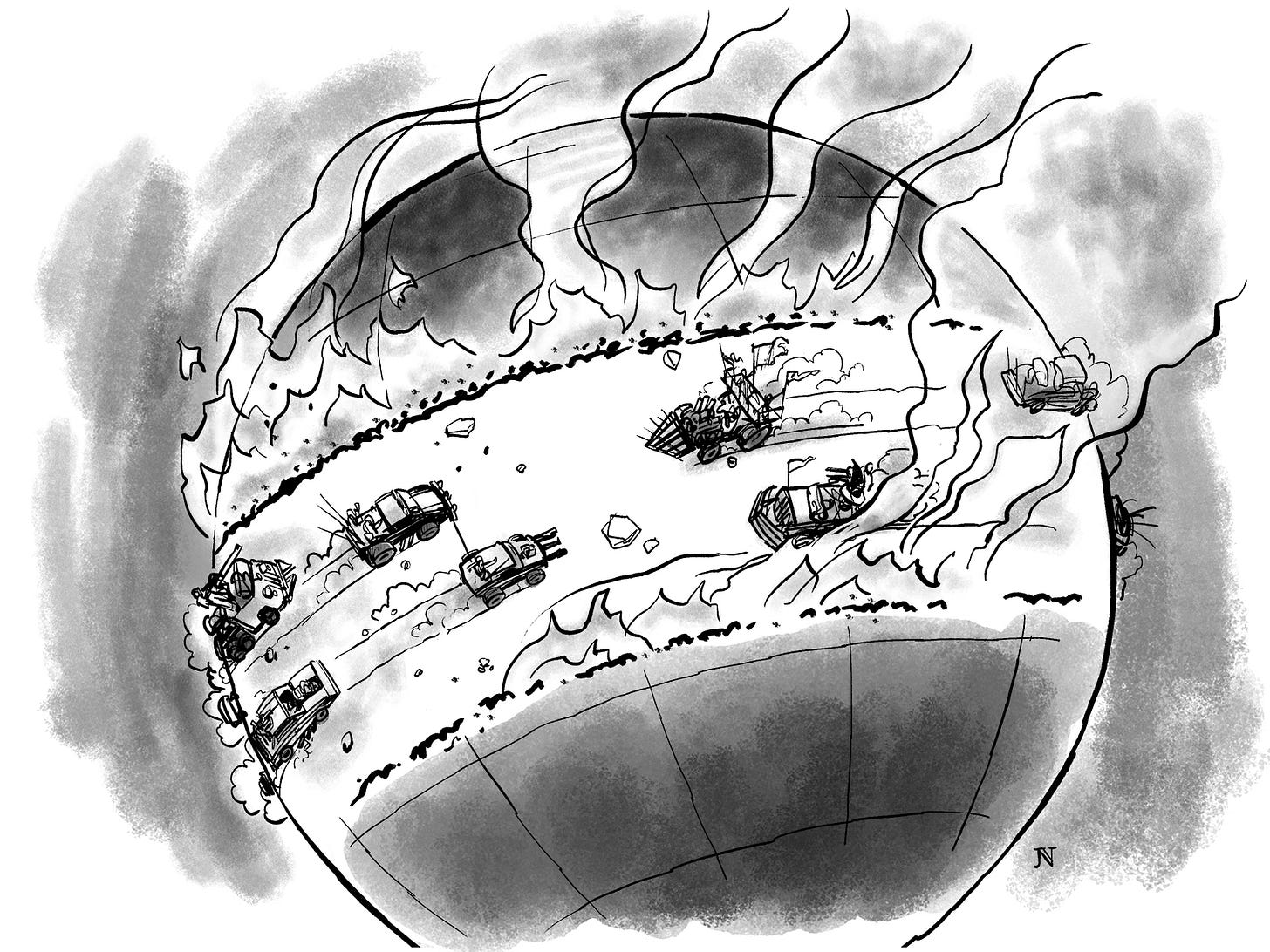Climate change brings national security home -- for good
Defending citizens against weather disasters begins to define state competency
We call them acts of God to excuse ourselves from being ready for them, but this what-can-I-do(?) response will no longer suffice with climate change.
Saudi Arabia, which makes billions off the annual hajj, claimed it was ready for this year’s hotter-than-hell version, and something like 1,300 pilgrims (likely a low count) died from the heat. I mean, if Riyadh let 1,300 die in a terror strike, that would be a big deal, right? Officials would be held responsible? One imagines any state only gets so many passes on these disasters as they accumulate (You knew about this and did NOTHING!).
One government that seems to grow ever more sensitive to this spreading dynamic is China’s. Having been a civilization for five millennia, there is a VERY long history of associating natural disasters with judgments from on high, judgments that reflect badly on the emperor supposedly personally in touch with those higher powers. Divine retribution for poor leadership performance: that’s the basic idea.
We have a muted version of that concept/expectation in the West — far less divine. Recall the damage to the George W. Bush administration over its poor/delayed/ indifferent handling of Hurricane Katrina’s devastation of New Orleans.
But it matters more in China because such retribution undercuts the emperor’s authority per the Mandate from Heaven — meaning a cosmic deal of sorts was already cut to prevent such things (or to acknowledge non-performance). Thus, when they happen, it’s the middleman emperor who takes the political hit. Both the people and Heaven deserve better.
From some excellent NYT reporting:
Three years after Zhengzhou was hit with China’s deadliest flash floods in decades, the central Chinese city was underwater once again.
For over three hours on Monday afternoon, 9.21 inches of rain fell on this city of 13 million — and forced an all-out effort to prevent a repeat of 2021, when 300 people died in a sudden deluge that flooded the subway and trapped people in submerged cars.
This time, local authorities weren’t taking chances. They canceled buses, closed tourist sites and warned residents to stay home. Water pumps were deployed to prevent underpasses from flooding. Subway entrances were barricaded with sandbags and metal sheeting.China’s summer has begun with a huge emergency-response effort in multiple provinces to prevent extreme weather, now routine, from turning into a political and humanitarian crisis for the ruling Communist Party.
Drowning in the subway: that’s the sort of nobody-should-ever-have-to-die-that-way vibe that really motivates political anger and demands for responsive reforms.
For now, in places like the US (with our uniquely plus-sized denialism crowd), this sort of blame remains diffused: we may blame fossil fuel companies, big business, cows, “misguided” scientists, capitalism, etc. When blame remains that diffuse, not all that much gets done, and, to the extent that it does, it leans toward the mitigation side (Fix it, damnit!) versus the adaptation (Isn’t that just quitting?).
That will change for us, moving more in the direction of China’s pro-activeness. For now, we wait on aftermath players, like insurance, to crack some imaginary whip (always a money penalty).
We also blame local officials, because they’re first on the spot and … frankly … they’re historically, in our system, on the big hook for response. The Fed (FEMA) is only supposed to show up when the locals are overwhelmed — a model certain to change with time and enough climate-delivered pain.
Climate Change Added a Month’s Worth of Extra-Hot Days in Past Year — Since last May, the average person experienced 26 more days of abnormal warmth than they would have without global warming, a new analysis found.
Why? Simultaneity is arising: the same disaster hitting far wider areas at the same time, or for longer and more sustained stretches. We are adding (see above), on average, extra extreme-heat days every year. At some point not that far in the future, those dates will dominate and define the calendars of cities and towns and counties and states across much of our nation. Our models for disasters and responses aren’t built on that sort of bigger data, but they soon enough will be.
And when that everywhere sense of emergency arises, it will become a national phenomenon with commensurate political dynamics. Citizens will care less about how we’re “managing” that war over there (involving those people) than about how we’re managing an inevitably routine flow of climate crises and the people they put on the march.
That evolution will come to EVERY superpower. China’s just in the lead for now.
You’ve seen the numbers from NOAA:
Keep reading with a 7-day free trial
Subscribe to Thomas P.M. Barnett’s Global Throughlines to keep reading this post and get 7 days of free access to the full post archives.




